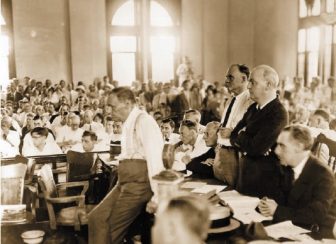On July 10, 1925, a high school biology teacher, John T. Scopes of Dayton, Tennessee, was charged in court with teaching evolution in violation of the Butler Act, a law recently passed by the Tennessee State Assembly that made it an offense to teach “any theory that denies the…Divine Creation of man.” The “Monkey Trial” attracted worldwide attention, filling the newspapers for weeks as two of the leading lawyers of the day, William Jennings Bryan for the prosecution and Clarence Darrow for the defense, battled it out in the stifling Dayton courtroom. Once the trial was over, it was replayed in books, movies, and plays, being immortalized most memorably in only slightly fictionalized form by the 1960 Stanley Kramer film Inherit the Wind. Inevitably, the facts of the trial became lost in a haze of mythology.
 In the popular myth, Scopes was represented as an innocent victim and the trial itself was represented as an unequivocal triumph of science over religion. Darrow was portrayed as the winner, and Bryan died of a broken heart shortly after losing. The facts are different. Scopes, a substitute teacher with a strong interest in the freedom of expression but no particular attachment to evolutionary theory, had volunteered at the prompting of the American Civil Liberties Union to participate in a deliberate test of the Butler Act. Indeed, it was Scopes himself who had betrayed his actions to the authorities. The case actually was won by the prosecution. However, the judge did not allow the merits of evolution versus creation to be debated in the courtroom, instead restricting argument to whether the law as written had actually been broken—and of course it had been. Although Bryan did die not long after winning the case, he died not from sorrow but rather from complications of diabetes.
In the popular myth, Scopes was represented as an innocent victim and the trial itself was represented as an unequivocal triumph of science over religion. Darrow was portrayed as the winner, and Bryan died of a broken heart shortly after losing. The facts are different. Scopes, a substitute teacher with a strong interest in the freedom of expression but no particular attachment to evolutionary theory, had volunteered at the prompting of the American Civil Liberties Union to participate in a deliberate test of the Butler Act. Indeed, it was Scopes himself who had betrayed his actions to the authorities. The case actually was won by the prosecution. However, the judge did not allow the merits of evolution versus creation to be debated in the courtroom, instead restricting argument to whether the law as written had actually been broken—and of course it had been. Although Bryan did die not long after winning the case, he died not from sorrow but rather from complications of diabetes.
Still, the importance of the Monkey Trial lay far less in its legal aspects than in the realm of public perception. Both Bryan and Darrow used every ploy possible in arguing their sides, and even though Scopes admitted breaking the law and was fined $100 at the time (the conviction was later overturned on a technicality, and the state did not see fit to return to court), the cross-examination on both sides yielded the material for high drama. In the court of public opinion, reinforced by continuing media coverage, there was little doubt that Scopes and Darrow had won. All in all, then, the case turned out to be a Pyrrhic victory for the creationist side. Nonetheless, the Scopes Monkey Trial did not lay to rest the matter of teaching evolution versus creationism. Activist fundamentalists in Mississippi and Arkansas soon passed bills similar to the Butler Act, which itself was not repealed until 1967. Another trial, “Scopes II,” was to follow in Arkansas in 1981, although this time the finding was in favor of the opponents of “creation science.” The issue has not gone away and seems unlikely to do so any time soon.
References:
- Fuyuyma, D. (1983). Science on trial: The case for evolution. New York: Pantheon.
- Gilkey, L. (1985). Creationism on trial: Evolution and God at Little Rock. Minneapolis, MN: Winston.
- Godfrey, L. (Ed.). (1983). Scientists confront creationism. New York: Norton.

